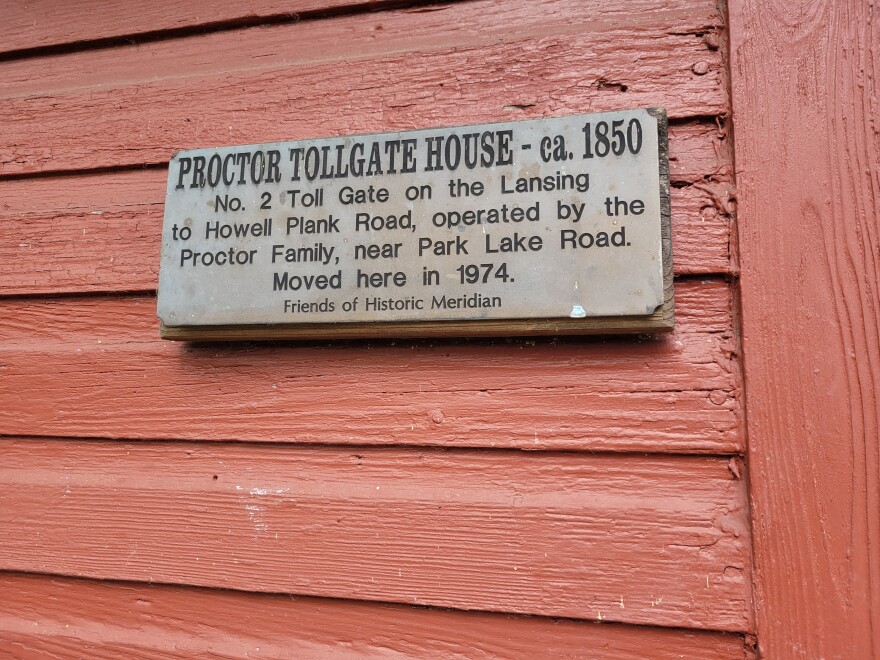As Congress debates a trillion-dollar infrastructure bill, it’s clear the way we get around and the way the government makes that possible is critical to the country’s growth.
Picture this:
It’s 1848, and you're a state legislator traveling from Detroit to the new capital in Lansing. You have to rely on rough dirt trails through the heavily forested land. The trip may take three to six days, but a new form of roadway could cut that time down to 10 or 12 hours.
Patrick Reynolds is the executive director of Friends of Historic Meridian. He describes what plank roads were.
"At their most basic level, they're just wooden roads, fairly simple construction."
It was essentially a way to connect rural communities to each other using the resources they had readily at hand.
He says plank roads became popular in Michigan for several reasons.
"It was essentially a way to connect rural communities to each other using the resources they had readily at hand, which at the time, were quite a lot of cheap lumber," Reynolds said.
There was a nationwide boom of plank road construction in the 1840s and '50s, just after Michigan became a state in 1837.
Historian Jane Rose says state leaders at the time knew the best way to get new residents here was to make it easier to travel and work.
"The way to become a progressive, thriving state is to bring commerce and industry into your state," Rose said. "You don't attract much if you don't have good transportation resources."
So much so, Michigan eventually had more plank roads than any other state at the time.
The way it would work is private companies would form and get a charter from the state to build a road.

They would then charge a fee about every six miles at a tollgate house for people to use them.
One of the only actual plank road tollgate houses left in Michigan is near Okemos.
Built around 1850, the house now sits in the Meridian Historical Village. Though, its original location was on Grand River Avenue at Park Lake Road.
You might recognize the busy street on your way from East Lansing into Okemos.
The small, red one-room building was the second stop on the route from Lansing to Howell. At the end of the road, travelers would switch to another one to take to Detroit.
Reynolds says a farming family managed this tollgate house.
"Ours was the Proctor toll house. Which, it was the Proctor farmhouse that was just sort of the closest farm to where they built the road," he said. "[It's] how the Proctors ended up with that had a side hustle, or side gig, as we'd say today."

If someone was traveling on the plank road and made a stop here, they might pay about a few cents per mile per horse. Then, someone at the house would lift the gate for you to keep traveling.
But shortly after the boom for plank roads came a bust. By the 1870s, the entire road had been replaced by a gravel turnpike.
Reynolds says there’s a simple answer as to why plank roads didn’t last and aren’t well known as part of the state’s history.
"They rot almost immediately. They're quite hard to maintain, and they basically need constant replacement in wet climates like this."
Rose says the roads didn’t end up just being expensive to keep functioning, they were also dangerous.
"As the weather got on the boards, they started to curl, like you would see most planks curling. And they were called road snakes."
If a stagecoach driver missed spotting a road snake up ahead, it could lead to disastrous consequences.
"It could go actually up through the bottom of the stagecoach [and] flip the coach along with the horses. Passengers, the driver, the horses could be injured or killed," Rose said.
While no one’s riding on the small replica of a plank road outside the tollgate house in the historic village now, Reynolds says his organization deals with the same problems when it comes to maintaining it.
"We were shut down for COVID last year. The way that the planks have warped and how much effort and maintenance it takes just for something that simple is, it's impressive just to see and how quickly it rots," he said.
But for Reynolds and Rose, they both say it’s worth the effort to keep the tollgate house preserved for future generations to learn about.
We have to hold on to those artifacts and buildings that are important to our progress.
"In order to preserve the history and teach the history, we have to hold on to those artifacts and buildings that were important to our progress," Rose said. "Otherwise, it's just a theoretical concept."
If you want to take your own trip back in history, the tollgate house is open to visitors daily through the summer to early fall in the Meridian Historical Village.


